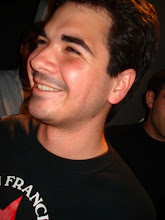I just finished watching tonight's episode of
Studio 60 on the Sunset Strip. For those of you who haven't heard of it, it's the new television series by
Aaron Sorkin, creator of
The West Wing (my all-time favorite show), featuring
Matthew Perry,
Bradley Whitford,
Amanda Peet,
Steven Weber and a number of other talent actors. The series is a drama which gives a behind-the-scenes look at a Saturday Night Live-style sketch comedy show.
West Wing was essentially a liberal political fantasy land (c'mon, a presidential election pitting a religious Latino Democrat from Texas against a pro-choice Republican from California?), occasionally leaning on characters like Ainsley Hayes and Arnold Vinick (the Republican presidential candidate) to provide intelligent conservative counter-arguments. With Studio 60, Sorkin has found a soapbox which allows him to provide
slightly more subtle commentary on our society, albeit one that isn't quite as satisfying for politics junkies like yours truly. Sorkin's message these days largely eschews the left-right dichotomy in favor of a centrist-populist mentality which thus far I've found quite enjoyable, if occasionally a bit preachy.
One theme which has been central to many--if not all--of the episodes thus far is the struggle between art and commerce, featured most prominently in the pilot episode where a rogue producer interrupts a live broadcast to go on a rant about the disgraceful state of network television ("We're all being lobotomized by this country's most influential industry...guys are getting killed in a war that's got theme music and a logo...the two things that scare them are the FCC and every psycho religious cult that gets positively horny at the very mention of a boycott"). It's a worthy topic to engage, albeit somewhat ironic given the series role as an expensive new flagship show for NBC's fall lineup.
Speaking of irony, I haven't seen a demographic breakdown of Studio 60's viewers, but I'd wager that like West Wing it is watched primarily by mid-to-high income white households in the Northeast and California. Sorkin is bathing his elitist liberal viewers (myself included) with repeated admonitions to have greater respect and tolerance for the (non-hypocritical, non-Pat Robertson) religious people who make up a significant portion of this country, but he's doing so in a format that "others" the very people he wants his viewers to be be more accepting towards (using "others" as a verb... had a few race theory discussions in college, have we?).
If, like me, you want a less patronizing TV experience to assist you in understanding people that come from a culture you find completely alien, I highly recommend checking out
Friday Night Lights, a great new series centered around a Texas high school football team. It looks real and gritty, has a strong ensemble cast, doesn't give the feeling that it's trying too hard to cram a certain message or narrative down your throat, and leaves you eager for the next episode without using faux-drama to create an unreasonable cliffhanger.
Labels: Friday Night Lights, media, Studio 60, tv

